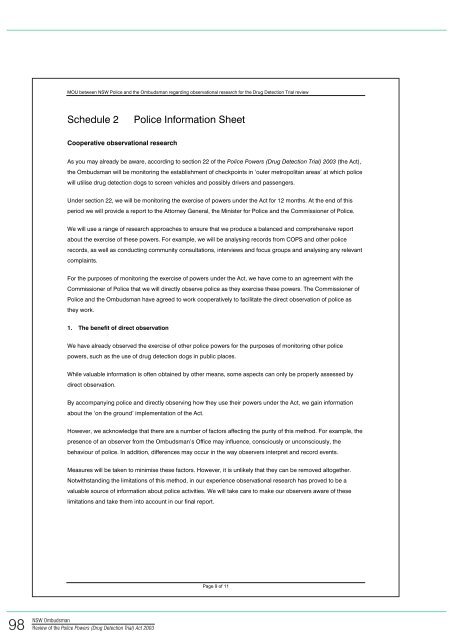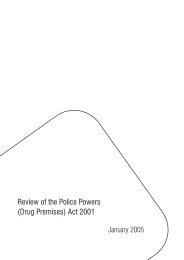Review of the Police Powers (Drug Detection Trial) Act 2003 - NSW ...
Review of the Police Powers (Drug Detection Trial) Act 2003 - NSW ...
Review of the Police Powers (Drug Detection Trial) Act 2003 - NSW ...
Create successful ePaper yourself
Turn your PDF publications into a flip-book with our unique Google optimized e-Paper software.
MOU between <strong>NSW</strong> <strong>Police</strong> and <strong>the</strong> Ombudsman regarding observational research for <strong>the</strong> <strong>Drug</strong> <strong>Detection</strong> <strong>Trial</strong> review<br />
Schedule 2<br />
<strong>Police</strong> Information Sheet<br />
Cooperative observational research<br />
As you may already be aware, according to section 22 <strong>of</strong> <strong>the</strong> <strong>Police</strong> <strong>Powers</strong> (<strong>Drug</strong> <strong>Detection</strong> <strong>Trial</strong>) <strong>2003</strong> (<strong>the</strong> <strong>Act</strong>),<br />
<strong>the</strong> Ombudsman will be monitoring <strong>the</strong> establishment <strong>of</strong> checkpoints in ‘outer metropolitan areas’ at which police<br />
will utilise drug detection dogs to screen vehicles and possibly drivers and passengers.<br />
Under section 22, we will be monitoring <strong>the</strong> exercise <strong>of</strong> powers under <strong>the</strong> <strong>Act</strong> for 12 months. At <strong>the</strong> end <strong>of</strong> this<br />
period we will provide a report to <strong>the</strong> Attorney General, <strong>the</strong> Minister for <strong>Police</strong> and <strong>the</strong> Commissioner <strong>of</strong> <strong>Police</strong>.<br />
We will use a range <strong>of</strong> research approaches to ensure that we produce a balanced and comprehensive report<br />
about <strong>the</strong> exercise <strong>of</strong> <strong>the</strong>se powers. For example, we will be analysing records from COPS and o<strong>the</strong>r police<br />
records, as well as conducting community consultations, interviews and focus groups and analysing any relevant<br />
complaints.<br />
For <strong>the</strong> purposes <strong>of</strong> monitoring <strong>the</strong> exercise <strong>of</strong> powers under <strong>the</strong> <strong>Act</strong>, we have come to an agreement with <strong>the</strong><br />
Commissioner <strong>of</strong> <strong>Police</strong> that we will directly observe police as <strong>the</strong>y exercise <strong>the</strong>se powers. The Commissioner <strong>of</strong><br />
<strong>Police</strong> and <strong>the</strong> Ombudsman have agreed to work cooperatively to facilitate <strong>the</strong> direct observation <strong>of</strong> police as<br />
<strong>the</strong>y work.<br />
1. The benefit <strong>of</strong> direct observation<br />
We have already observed <strong>the</strong> exercise <strong>of</strong> o<strong>the</strong>r police powers for <strong>the</strong> purposes <strong>of</strong> monitoring o<strong>the</strong>r police<br />
powers, such as <strong>the</strong> use <strong>of</strong> drug detection dogs in public places.<br />
While valuable information is <strong>of</strong>ten obtained by o<strong>the</strong>r means, some aspects can only be properly assessed by<br />
direct observation.<br />
By accompanying police and directly observing how <strong>the</strong>y use <strong>the</strong>ir powers under <strong>the</strong> <strong>Act</strong>, we gain information<br />
about <strong>the</strong> ‘on <strong>the</strong> ground’ implementation <strong>of</strong> <strong>the</strong> <strong>Act</strong>.<br />
However, we acknowledge that <strong>the</strong>re are a number <strong>of</strong> factors affecting <strong>the</strong> purity <strong>of</strong> this method. For example, <strong>the</strong><br />
presence <strong>of</strong> an observer from <strong>the</strong> Ombudsman’s Office may influence, consciously or unconsciously, <strong>the</strong><br />
behaviour <strong>of</strong> police. In addition, differences may occur in <strong>the</strong> way observers interpret and record events.<br />
Measures will be taken to minimise <strong>the</strong>se factors. However, it is unlikely that <strong>the</strong>y can be removed altoge<strong>the</strong>r.<br />
Notwithstanding <strong>the</strong> limitations <strong>of</strong> this method, in our experience observational research has proved to be a<br />
valuable source <strong>of</strong> information about police activities. We will take care to make our observers aware <strong>of</strong> <strong>the</strong>se<br />
limitations and take <strong>the</strong>m into account in our final report.<br />
Page 9 <strong>of</strong> 11<br />
98<br />
<strong>NSW</strong> Ombudsman<br />
<strong>Review</strong> <strong>of</strong> <strong>the</strong> <strong>Police</strong> <strong>Powers</strong> (<strong>Drug</strong> <strong>Detection</strong> <strong>Trial</strong>) <strong>Act</strong> <strong>2003</strong>

















